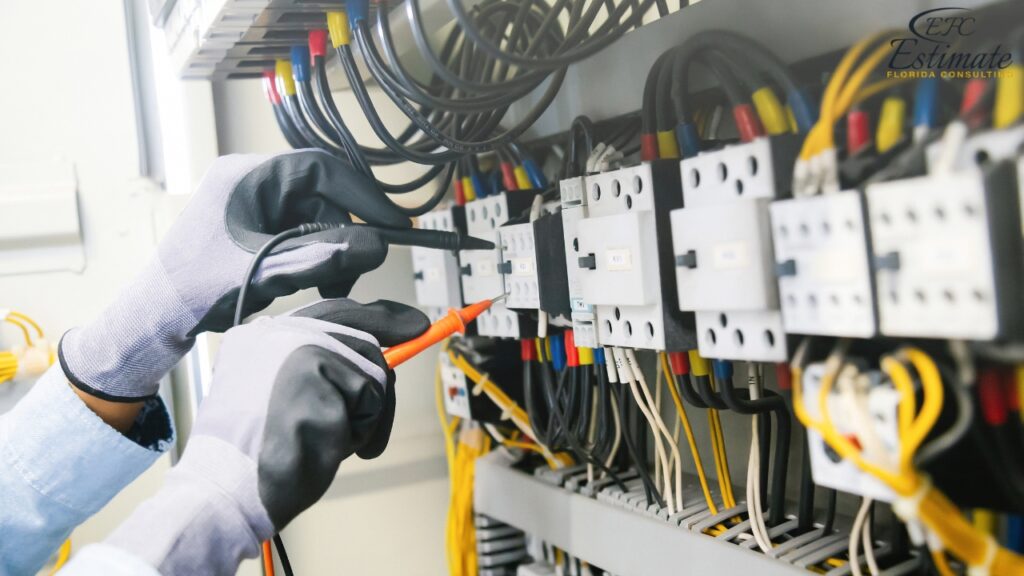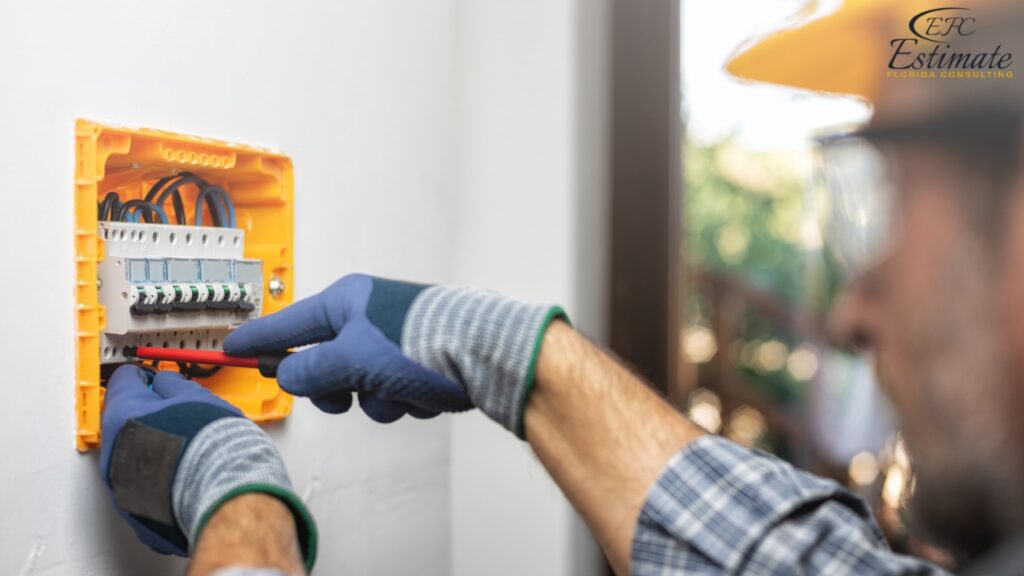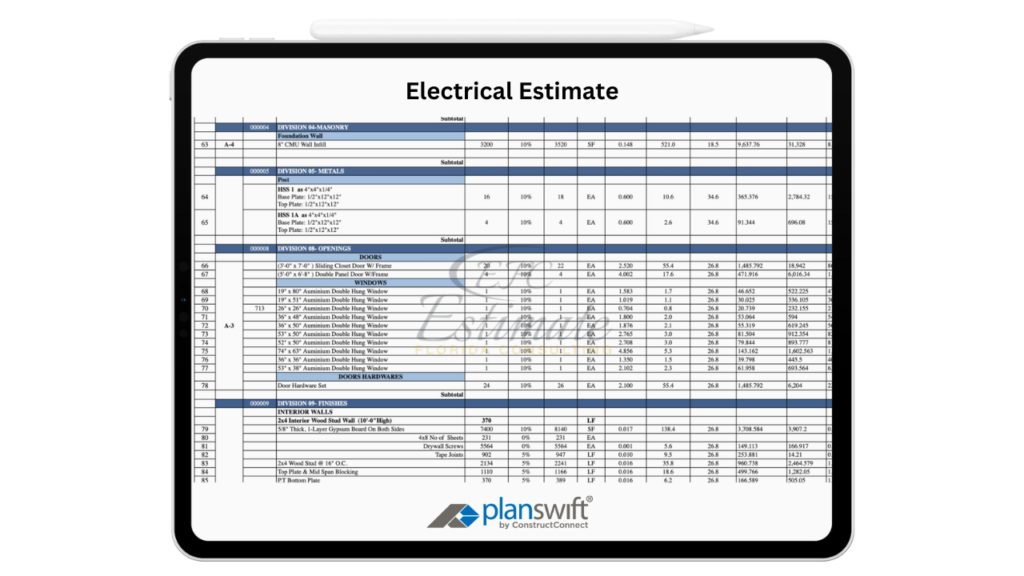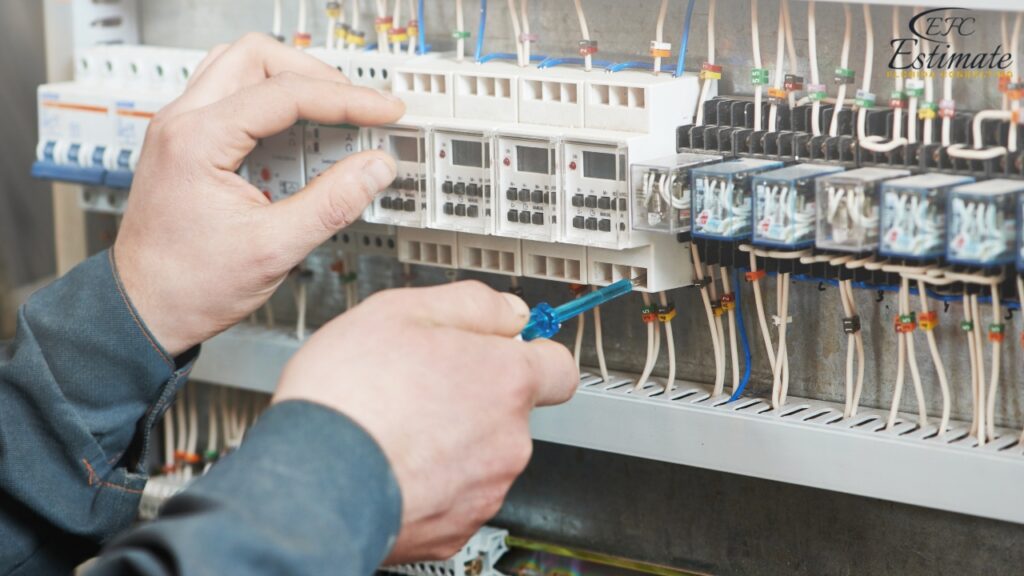How Much Does It Cost to Redo Electrical in a House?
Redoing the electrical system in a house typically costs between $19,253 and $102,752, or about $8 to $15 per square foot. This includes materials, labor, permits, and upgrading all wiring, outlets, switches, and the electrical panel. Costs can vary based on the house size, job complexity, local labor rates, and the quality of materials used. Additional expenses might come up if you need to open walls, install new circuits, or add smart home features. Proper planning and hiring a licensed electrician ensures safety, code compliance, and better electrical efficiency for your home.

Factors Influencing the Cost of Redoing Electrical Work
Size of the House
The size of the house is one of the primary factors that affect the cost of redoing electrical work. Larger homes require more materials and labor, leading to higher costs.
House Size | Estimated Cost Range |
Small (1,000 sq ft) | $6,760 – $10,140 |
Medium (2,000 sq ft) | $13,520 – $20,280 |
Large (3,000 sq ft) | $20,280 – $30,420 |
Larger homes not only require more wiring but also more outlets, switches, and circuit breakers. This increased demand for materials and labor results in higher overall costs. Additionally, larger homes may have more complex electrical systems, requiring additional expertise and time to complete the job correctly. In larger homes, there may also be more rooms and specialized areas such as home offices, entertainment rooms, and workshops, all of which need specific electrical configurations. Therefore, understanding the size of your house is crucial in estimating the total cost accurately.
Complexity of the Work
The complexity of the electrical work also plays a significant role in determining the cost. Factors such as the age of the house, the condition of the existing wiring, and the extent of the upgrades required can all impact the total cost.
Complexity Level | Estimated Additional Cost |
Basic Upgrade | $1,690 – $3,380 |
Moderate Rewiring | $5,070 – $6,760 |
Extensive Rewiring | $8,450 – $16,900 |
Basic upgrades might include installing new outlets and switches, while moderate rewiring involves replacing outdated wiring and adding new circuits. Extensive rewiring, on the other hand, could involve a complete overhaul of the electrical system, including upgrading the service panel and installing new fixtures throughout the house. The more complex the work, the higher the labor costs, as skilled electricians will spend more time ensuring the job is done safely and correctly. Complex projects may also require permits and inspections, adding to the overall cost and timeline. Additionally, homes with older wiring systems may require special handling and disposal of hazardous materials, which can further increase costs.
Labor Costs
Professional Electricians
Hiring licensed electricians is essential for redoing electrical work in a house. Professional electricians charge based on their level of expertise and the complexity of the job.
Labor Task | Estimated Cost per Hour | Total Hours Required | Total Cost |
Basic Wiring | $84.50 – $169 | 40 – 80 | $3,380 – $13,520 |
Advanced Wiring | $118.30 – $202.80 | 80 – 160 | $9,464 – $32,448 |
Installation and Testing | $84.50 – $169 | 20 – 40 | $1,690 – $6,760 |
Labor costs can vary significantly depending on the region and the specific requirements of the project. More complex tasks, such as installing a new service panel or running new circuits, require higher levels of expertise and can increase labor costs. Ensuring that the electricians you hire are licensed and experienced can prevent costly mistakes and ensure the job meets all safety standards and building codes. Additionally, professional electricians can provide valuable advice on optimizing the electrical system for future needs, potentially saving you money in the long run. Experienced electricians also bring a wealth of knowledge about troubleshooting and preventing common electrical issues, ensuring a safer and more reliable system.

DIY vs. Professional Work
While some homeowners may consider DIY electrical work to save money, it is generally not recommended due to the risks involved. Electrical work can be dangerous and complex, and mistakes can lead to serious safety hazards. Hiring professional electricians ensures that the job is done safely and to code.
DIY Task | Estimated Cost |
Basic Wiring (Materials Only) | $1,690 – $3,380 |
Advanced Wiring (Materials Only) | $3,380 – $6,760 |
Installation and Testing (Materials Only) | $845 – $1,690 |
Attempting DIY electrical work can result in incomplete or incorrect installations, which may lead to costly repairs and potential safety hazards. While the initial cost savings may seem attractive, the long-term risks and potential expenses make hiring professional electricians a more reliable and safer choice. Professionals bring the right tools, knowledge, and experience to the job, ensuring it is completed efficiently and correctly. Moreover, DIY electrical work can void home insurance policies if it does not meet local codes and standards, potentially leading to significant financial liability in the event of an electrical fire or other issue. Hiring a professional can also provide peace of mind, knowing that the work is backed by a guarantee or warranty.
Materials and Components
Wiring and Cables
The type and amount of wiring and cables needed for the project significantly impact the total cost. High-quality, durable wiring is essential for a safe and long-lasting electrical system.
Material Type | Estimated Cost per Foot | Total Cost (for 2,000 sq ft House) |
Standard Copper Wiring | $0.85 – $1.69 | $1,690 – $3,380 |
High-Grade Copper Wiring | $1.69 – $3.38 | $3,380 – $6,760 |
Using high-grade materials ensures better conductivity and longevity, reducing the likelihood of electrical issues in the future. Investing in quality wiring can prevent potential problems and ensure a more reliable electrical system. Additionally, using the appropriate gauge of wire for each circuit type is crucial to meet safety standards and prevent overheating. High-grade wiring can also offer better resistance to corrosion and physical damage, which is particularly important in areas with harsh environmental conditions. Opting for premium materials can also enhance the overall value of your home by ensuring a robust and reliable electrical infrastructure.
90% More Chances to Win Projects With Our Estimate!
- Multi-Family Building
- Hotel Building
- Hospital Building
- Warehouse Building
- School & University Building
- High-Rise Building
- Shopping Complex
- Data Center Building

Service Panels and Circuit Breakers
Upgrading the service panel and circuit breakers is often necessary when redoing electrical work. This upgrade ensures that the electrical system can handle the increased load from new appliances and fixtures.
Component | Estimated Cost |
Service Panel (200 amps) | $1,690 – $3,380 |
Circuit Breakers | $169 – $338 each |
Installing a new service panel with higher capacity can accommodate future electrical needs and improve overall safety. Circuit breakers protect the electrical system by interrupting the flow of electricity in case of overloads or short circuits, preventing potential hazards. Upgrading these components is essential for modernizing the electrical system and ensuring it meets current safety standards. Modern service panels also provide additional slots for future expansion, allowing for easy integration of new circuits as needed. High-quality circuit breakers offer better protection and reliability, reducing the risk of electrical fires and other hazards.
Outlets, Switches, and Fixtures
Replacing old outlets, switches, and fixtures with new ones is an important part of redoing electrical work. These components not only enhance the functionality of the electrical system but also improve the aesthetics of the house.
Component | Estimated Cost per Unit | Total Cost (for 2,000 sq ft House) |
Standard Outlets and Switches | $6.50 – $13 | $169 – $338 |
GFCI Outlets | $17 – $33.80 | $338 – $676 |
Light Fixtures | $84.50 – $169 | $1,690 – $3,380 |
Upgrading to modern outlets and switches, including GFCI outlets in kitchens and bathrooms, enhances safety and convenience. New light fixtures can improve energy efficiency and provide better lighting, enhancing the overall ambiance of the house. Selecting high-quality fixtures and components can ensure long-lasting performance and reduce the need for future replacements. Modern outlets and switches often include additional features such as USB charging ports and smart home compatibility, adding convenience and value to your home. Investing in energy-efficient light fixtures can also lead to significant savings on electricity bills over time.

Additional Costs
Permits and Inspections
Obtaining the necessary permits and scheduling inspections are critical steps in redoing electrical work. These ensure that the work complies with local building codes and safety regulations.
Permit and Inspection Task | Estimated Cost |
Electrical Permit | $169 – $338 |
Inspection Fees | $169 – $338 |
Permits and inspections add to the overall cost but are essential for ensuring the safety and legality of the electrical work. Failing to obtain the necessary permits can result in fines and potential safety hazards. Regular inspections throughout the project help identify and address issues early, ensuring that the work meets all required standards and passes final inspections. Obtaining the proper permits and passing inspections can also enhance the resale value of your home, as potential buyers will appreciate the verified safety and quality of the electrical system. Inspections provide an additional layer of oversight, ensuring that all work is completed to the highest standards.
Energy-Efficient Upgrades
Incorporating energy-efficient upgrades into the electrical system can provide long-term savings on utility bills. These upgrades may include installing LED lighting, energy-efficient appliances, and smart home systems.
Upgrade Type | Estimated Cost |
LED Lighting | $84.50 – $169 per fixture |
Energy-Efficient Appliances | $845 – $1,690 each |
Smart Home Systems | $1,690 – $3,380 |
While these upgrades may increase the initial cost, they can significantly reduce energy consumption and lower utility bills over time. Energy-efficient upgrades also contribute to a more sustainable and environmentally friendly home. Additionally, some energy-efficient upgrades may qualify for rebates or tax incentives, further offsetting the initial costs and enhancing the overall value of the investment. Investing in smart home systems can also provide enhanced convenience and control over your home’s electrical system, improving overall efficiency and user experience. Energy-efficient appliances and lighting not only reduce operating costs but also have a lower environmental impact, making your home more eco-friendly.
Additional Considerations
Timeline
The timeline for redoing electrical work can vary depending on the scope of the project and the availability of electricians. A typical rewiring project may take several days to several weeks to complete. Proper planning and scheduling can help minimize disruptions to daily life and ensure the project stays on track. Communicating with the electricians about the timeline and any potential challenges can help manage expectations and avoid delays. Having a clear timeline also allows for better coordination with other renovation tasks, ensuring a smoother overall project workflow.
Choosing the Right Electrician
Selecting a licensed and experienced electrician is crucial for the success of the project. Research potential electricians, check reviews, and ask for references to ensure you hire a reputable professional. A good electrician will provide a detailed estimate, clear communication, and a timeline for completion. They should also be familiar with local building codes and regulations, ensuring that the work meets all safety standards. Hiring a skilled electrician can prevent costly mistakes and ensure the job is done right the first time, providing peace of mind and long-term reliability. Additionally, a reputable electrician will have the necessary insurance and bonding, protecting you from potential liabilities and ensuring a higher standard of workmanship.
Financing Options
Given the potentially high cost of redoing electrical work, exploring financing options can be beneficial. Home improvement loans, lines of credit, or even specialized financing through energy-efficient upgrade programs can help manage the financial burden. Some utility companies and government programs offer incentives and rebates for energy-efficient upgrades, which can help offset costs. Consulting with a financial advisor can help identify the best financing options for your specific situation. Proper financing can make it easier to undertake necessary electrical upgrades without compromising on quality or safety. Additionally, spreading the cost over time can make the investment more manageable, allowing you to benefit from the upgrades immediately while paying for them over a longer period.
Download Template For Electrical Project Breakdown
- Materials list updated to the zip code
- Fast delivery
- Data base of general contractors and sub-contractors
- Local estimators

Conclusion
Redoing the electrical system in a house is a substantial investment that requires careful planning and budgeting. By understanding the various factors that influence the cost, including the size of the house, the complexity of the work, labor, materials, and additional costs such as permits and energy-efficient upgrades, homeowners can make informed decisions and ensure a successful project. Properly managing these aspects can lead to a safer, more efficient, and more valuable home. Investing in high-quality materials and professional labor ensures the longevity and reliability of your electrical system, providing peace of mind and enhancing the overall living experience. Moreover, energy-efficient upgrades can offer significant long-term savings and environmental benefits, making the investment worthwhile. By approaching the project with a clear plan and understanding of the costs involved, you can achieve a successful electrical upgrade that meets your needs and enhances your home’s value.
FAQs
Redoing the electrical system in a house typically costs between $19,253 and $102,752, or about $8 to $15 per square foot. This includes materials, labor, permits, and upgrading all wiring, outlets, switches, and the electrical panel.
Several factors influence the cost, including the size of the house, the complexity of the job, local labor rates, and the quality of materials used. Additional expenses might arise if you need to open walls, install new circuits, or add smart home features.
The size of the house significantly impacts the cost, with larger homes requiring more materials and labor.
- Small (1,000 sq ft): $6,760 – $10,140
- Medium (2,000 sq ft): $13,520 – $20,280
- Large (3,000 sq ft): $20,280 – $30,420
The complexity of the work, such as the age of the house, the condition of the existing wiring, and the extent of the upgrades required, can all impact the total cost.
- Basic Upgrade: $1,690 – $3,380
- Moderate Rewiring: $5,070 – $6,760
- Extensive Rewiring: $8,450 – $16,900
Labor costs vary depending on the electrician’s expertise and the complexity of the job.
- Basic Wiring: $3,380 – $13,520
- Advanced Wiring: $9,464 – $32,448
- Installation and Testing: $1,690 – $6,760
Google Reviews



Process To Get Redo Electrical in a House Estimate Report
Here I am going to share some steps to get redo electrical in a house estimate report.
-
You need to send your plan to us.
You can send us your plan on info@estimatorflorida.com
-
You receive a quote for your project.
Before starting your project, we send you a quote for your service. That quote will have detailed information about your project. Here you will get information about the size, difficulty, complexity and bid date when determining pricing.
-
Get Estimate Report
Our team will takeoff and estimate your project. When we deliver you’ll receive a PDF and an Excel file of your estimate. We can also offer construction lead generation services for the jobs you’d like to pursue further.

